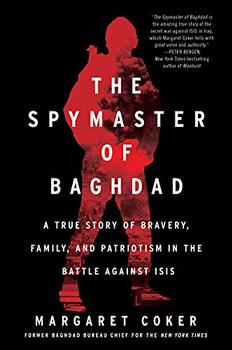Summary | Excerpt | Reading Guide | Reviews | Beyond the Book | Readalikes | Genres & Themes | Author Bio

A True Story of Bravery, Family, and Patriotism in the Battle against ISIS
by Margaret Coker
As fall moved to winter, Harith became drunk on this feeling of freedom. His hours with Nisreen made him believe that his life might take a different direction, one in which he didn't have to live in Saddam City, where he could choose his own wife and live happily ever after.
By springtime, his lack of interest in coursework bore consequences. When the Engineering Department posted the end-of-year-exam results, Harith's name was listed below the thick red line indicating who passed and who failed.
Suddenly, he was a man with a noose around his neck and the trapdoor had just opened underneath him.
No matter how violent life was in their neighborhood, the al-Sudani kitchen was always warm and full of loving energy. Before dawn, Um Harith would be up baking flatbread and brewing tea. She peeled vegetables all morning and carted jugs of drinking water from the neighborhood well. By the time Harith was in university, she had ten other children at home to feed and few tools to aid her.
The afternoon that Harith learned he had flunked his exams, he came straight home, eager to be surrounded by the comforting rituals of cooking that hadn't changed since he was little.
On Um Harith's two-burner range was a wide-mouthed steel cauldron simmering with chickpeas. Next to it was a tureen filled with white beans cooked tender in tomato sauce and a bit of goat meat for flavor.
Harith's sisters prepared the family room by spreading a plastic tablecloth decorated with red cherries on the floor. They poured laban, a thin yogurt drink, into plastic cups for the children and placed piles of fresh bread and washed herbs around the sitting area.
Harith wanted to tell his mother everything that had happened to him. How he had lost his heart and now his place at university. But he couldn't get the words out of his mouth. Um Harith was distracted with her multiple tasks, calling the children to come sit down and carrying the platters of food to the sofra, the cloth laid on the living room floor around which the family sat to eat their meals. She didn't notice anything wrong.
When his father came in and washed his hands, preparing for the meal, the television blared news in the background about America's plans to bomb the country. Harith's siblings sat around the edges of the sofra, each scooping food into their mouths with the fresh flatbread, laughing about a cartoon they had watched that morning.
Harith sat on his knees, twisting a tissue in his hands. He knew his task of delivering the bad news would be no easier for delaying it.
Father, I have some bad news, he said, the words rushing like a spring flood. I have flunked my exams. The college is kicking me out.
Um Harith waved a dishcloth in front of her face. She felt faint, as Harith continued to speak.
He told his parents that the reason for his poor academic performance was because he had fallen in love with a girl, a Sunni from Iraq's Kurdish region.
Abu Harith almost choked on his food. The television kept droning on, about American perfidy and doom. But the rest of the room was silent. They all knew that Harith's confession had done more damage than if an American missile had landed on their house.
Abu Harith screamed the same curses against his son that he had since Harith was little. But inside, his stoicism crumbled. He didn't sleep at all that night. Something had to be done to save his son's future and the family's reputation.
The next morning, he drove directly to Al-Jadriyah, to the university campus; his distraught demeanor helped coax the guards to allow him entry. Abu Harith sat in the corridor of the Engineering Department in abject protestation. He pleaded with the dean to reinstate his son. When he refused, Abu Harith tried to move higher up the administrative ladder, seeking out the university president himself.
Excerpted from The Spymaster of Baghdad by Margaret Coker. Copyright © 2021 by Margaret Coker. Excerpted by permission of Dey Street Books. All rights reserved. No part of this excerpt may be reproduced or reprinted without permission in writing from the publisher.
Your guide toexceptional books
BookBrowse seeks out and recommends the best in contemporary fiction and nonfiction—books that not only engage and entertain but also deepen our understanding of ourselves and the world around us.